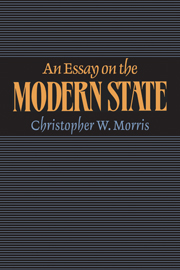9 - The functions of governments
Published online by Cambridge University Press: 05 June 2012
Summary
THE NATURE AND EXTENT OF LEGITIMATE STATE POWERS
What should governments do? Suppose a state to be legitimate – on my view, reasonably just and minimally efficient. What is it entitled to do? I have argued that states have much less authority than they claim. But legitimate states may nonetheless have considerable powers to govern, that is, to legislate and enforce rules. Even if their claims to authority are too ambitious to be warranted, their powers may be legitimate. To what ends should they use these powers?
Answers to these queries depend to a great extent on the nature of justice and the account we invoke. I have tried to make a large part of this book independent of specific controversies about justice. But ascertaining the proper functions of states seems to require determinate norms of justice – or so one would have thought. But some have claimed that most moral traditions in fact will justify very few state functions. It may be that states are so inefficient that virtually no plausible account of justice would endorse most of their activities. An investigation of the efficiency of particular states is beyond the scope of this essay, so I focus here on a recent account of the purposes of government.
Suppose we have negative, natural rights to our lives, liberty, and possessions and that these rights are (virtually) absolute or indefeasible.
- Type
- Chapter
- Information
- An Essay on the Modern State , pp. 266 - 287Publisher: Cambridge University PressPrint publication year: 1998



